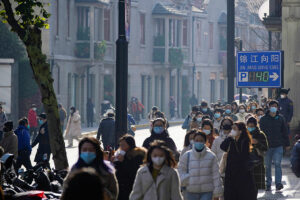
For many in China, the economy feels like it is in recession
SHANGHAI, Jan 18 (Reuters) – The night before China’s civil service exam, Melody Zhang anxiously paced up and down the corridor of her dormitory, rehearsing her answers. Only when she got back to her room did she realize she had been crying the whole time.
Ms. Zhang was hoping to start a career in state propaganda after more than 100 unsuccessful job applications in the media industry. With a record 2.6 million people going for 39,600 government jobs amid a youth unemployment crisis, she didn’t get through.
“We were born in the wrong era,” said the 24-year-old graduate from China’s top Renmin University.
“No one cares about their dreams and ambitions anymore in an economic downturn. The endless job-hunting is a torture.”
A crisis of confidence in the economy is deterring consumers from spending and businesses from hiring and investing, in what could become a self-feeding mechanism that erodes China’s long-term economic potential.
China grew 5.2% last year, more than most major economies. But for the unemployed graduates, the property owners who feel poorer as their flats are losing value, and the workers earning less than the year before, the world’s second-largest economy feels like it’s shrinking.
Zhu Tian, economics professor at China Europe International Business School in Shanghai, says the textbook definition of a recession – two consecutive quarters of economic contraction – should not apply to a developing country investing roughly 40% of its output annually, twice the level of the United States.
“We’re in a recession,” Zhu said. “If you talk to 10 people, seven will say we’ve had a bad year.”
“I don’t think the government can afford that. This cannot go on forever,” he said, urging more stimulus measures to break out what could be a “vicious cycle” of low confidence that will affect young people entering the job market in particular.
VANISHING ASPIRATIONS
More than one in five of the roughly 100 million Chinese aged 16-24 were unemployed in June, the last data point before officials suspended the series. China resumed publication of the data on Wednesday, excluding college students from it, to put youth unemployment at 14.9% in December.
China’s Generation Z is the most pessimistic of all age groups, surveys show.
Those who find jobs earn less than they expect as businesses cut costs in response to poor domestic demand. Recruiter Zhaopin found the average salary employers offered in China’s 38 biggest cities fell by 1.3% year-on-year in the fourth quarter.
For an economy which expanded roughly 60-fold in dollar terms since the 1980s, this is a historical shift in mood. That success was achieved largely through gigantic investments in manufacturing and infrastructure, but that model began producing more debt than growth about a decade ago, with total borrowing now reaching levels China struggles to service.
Meanwhile, China trained its students for high-skilled jobs in the services sector rather than factory or construction work. Subdued household consumption and regulatory crackdowns on the finance, tech and education industries have diminished their opportunities.
Janice Zhang, 34, had worked in the tech industry until late 2022 when she quit to handle a family emergency, confident she could easily find a new job given her experience and U.S. education.
But Zhang only found a social media marketing position, where she was expected to put in 15-hour shifts, so she quit after a short while.
The state of the economy makes her feel like a “grain of sand on the beach,” unable to control her own destiny, she said.
“In China, this word ‘aspiration’ has been driving everyone, because they believed tomorrow will be the best time. What I’m trying to conquer in my life now is, in a way, healing the disappointment tomorrow is going to bring.”
PROPERTY CRISIS
Vincent Li, the owner of a high-end coffee shop in Shanghai, took a one-two punch that he says knocked him out of the middle class.
As Chinese cut spending, they prefer cheaper coffee. And the two apartments he bought for 4 million yuan ($558,612) in 2017 on the touristy Hainan island haven’t attracted any renting or buying interest in three years.
“The property market is saturated,” Mr. Li said.
In China, 96% of the roughly 300 million urban households owned at least one apartment in 2019, according to the latest central bank data. A third owned two, and a tenth owned more.
About 70% of household savings are invested in property.
In some cities, apartments have lost two thirds of their value since the real estate market downturn began in 2021, property agents said, making their owners feel less wealthy and slash their spending.
The property sector, which accounted for roughly a quarter of economic activity at its peak, is now seen as a key threat to China’s attempts to escape the middle-income trap.
“The big risk is that the fallout from diminishing old growth sources could become too large to contain and inhibit new growth sources. If that happens, China could become stuck in transition,” said Yuen Yuen Ang, Alfred Chandler Chair of Political Economy at Johns Hopkins University.
It is not just domestic policies impacting life in China. Diplomatic tensions with the West over Taiwan, Ukraine and the South China Sea have contributed to its first ever foreign investment deficit.
Trade bodies have raised alarm over raids on consultancies and due diligence firms and exit bans, among other issues.
US tech restrictions on China prevent David Fincher’s consultancy in Shanghai from doing business in leading-edge semiconductors, blocking off a key source of income.
He is considering moving overseas, fearing more diplomatic tensions or new regulatory shifts from Beijing could make his business untenable.
“You feel like a lobster in a pot,” Mr. Fincher said. “The water gets hotter and you just kind of sit there.”
“I worry about Beijing as much as everybody else.” – Reuters



